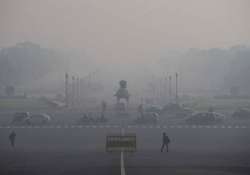Delhi records its most polluted day of the year
New Delhi: It was the most polluted day of the year in Delhi today with the authorities recording the highest levels of suspended particulate matters PM 2.5 and PM 10, taking the air quality into

New Delhi: It was the most polluted day of the year in Delhi today with the authorities recording the highest levels of suspended particulate matters PM 2.5 and PM 10, taking the air quality into the 'severe' category across the city.
Although a definite conclusion could not be reached immediately, the experts attribute the spike to "open biomass burning", mainly burning of dry leaves to fight cold, across the region for the "extraordinary rise" in the levels of the particulate matters.
The air quality across Delhi had plunged into 'severe' level post Diwali, but pollutants had shown a steady fall earlier this month.
The average of PM 2.5 (the tiniest and most damaging of all the particulate matters) and PM 10 were 295 and 470 micrograms per cubic metre respectively, which was multiple times above the corresponding safe limits of 60 and 100, centre's System of Air Quality and Weather Forecasting and Research (SAFAR) said.
Severe category air quality affects healthy persons and seriously impacts those with existing diseases. China's capital Beijing has a system in place to alert citizens when pollution takes such hazardous turn, according to the National Air Quality Index.
SAFAR's Chief Project scientist Gufran Beig said the possible reasons for such a "huge jump", include a rise in the quantity of pollutants from the Indo-Gangetic plains that ranges from Eastern part of the country to the West, and a substantial rise in open biomass in Delhi and its surrounding areas.
Read Also: Air quality in Delhi plunges to 'very poor' level
"Medium range transport of pollutants from Indo-Gangetic Plains (rich in pollution) is highest at this time that brings pollution-rich air, which after reaching Delhi, gets downward and pollute Delhi surface. The IGP regions (Kanpur, Varanasi, Lucknow, Patna, etc.) has shown a huge increase in particulate matters," Beig said.
According to SAFAR's forecast, there is no respite in sight as PM 2.5 is expected to remain in the same category over the next few days with a possible marginal fall on December 25 to 248 micrograms per cubic metre.
"Now, if there is a huge open biomass burning in IGP region, the transported air will be even more dirty and make Delhi more polluted," Beig said, adding that the kind of jump seen between December 21 and 23 "is unusual and meteorology cannot explain this jump."
World Health Organisation considers 25 to be the maximum safe level for PM 2.5 and as the best indicator of the level of health risks from air pollution.
Real time readings of Delhi Pollution Control Committee (DPCC) stations in Anand Vihar, Mandir Marg, Punjabi Bagh and RK Puram put PM 2.5 readings at 408, 336, 389 and 366 around 7.30 PM.
CPCB website, functional after almost two weeks, also displayed the 'severe' warning across its stations.
'Very poor' quality air signifies when PM 10 level is between 351 and 420, and PM 2.5 level is between 211 to 252 microgram per cubic metre.
The 'severe' air quality is declared when PM 2.5 and PM 10 cross 253 and 421 microgram per cubic metres respectively.